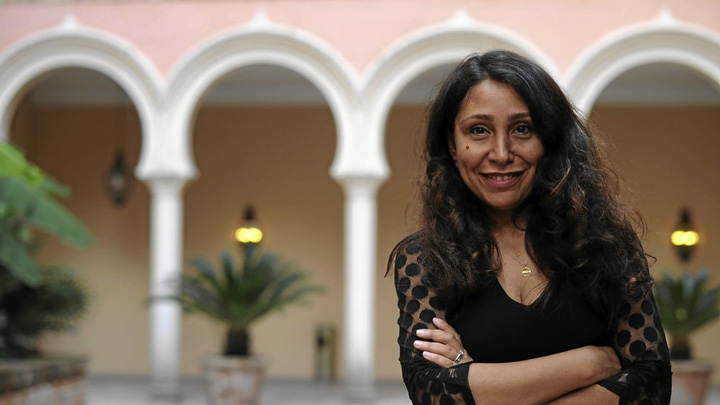
Film director of “Wadjda”, Haifaa Al Mansour of Saudi Arabia, poses during a photo session at the 69th Venice Film Festival on August 31, 2012 at Venice Lido. “Wadjda” is competing in the Orizzonti section of the festival. AFP PHOTO / TIZIANA FABI
VENICE, Italy – Haifaa Al Mansour has the distinction of being the first person to ever film a movie in Saudi Arabia, never mind that she’s a woman.
Al Mansour’s “Wadjda,” which premiered this week out of competition at the Venice Film Festival, is about a 10-year-old girl who dreams of having a bicycle so she can race a neighborhood boy. But the dream is just a little too subversive for a deeply conservative Muslim society where women live segregated existences and girls around Wadjda’s age are expected to begin fully covering their faces when in public.
“I feel so proud honestly to have shot the first film ever to be shot inside Saudi Arabia,” Al Mansour told The Associated Press. “It was an extremely difficult experience, but still it’s very rewarding and it says something about the country — that the country of Saudi Arabia is opening up, and there is a place for arts to grow, and there is a place for women.”
Despite having support within the Saudi royal family, Al Mansour said she had to cope with limits present within society. For example, severe restrictions on the mingling of men and women created challenges in directing male actors in outdoor scenes, she said.
“I had to stay in a van and talk through a telephone sometimes or through the producer,” she told a news conference.
The movie offers a rare and perhaps even unprecedented look into Saudi daily life.
Wadjda lives alone with her mother, played by Reem Abdullah, and they are visited only sometimes by her father. Devoted as he appears in person, he is seeking a second wife to have a son, a source of stress for Wadjda’s mother.
Wadjda is as unfazed by the family drama as her mother is distracted by it. The girl instead focuses on how she can get enough money — 800 Saudi riyals, or $213 — to buy a green bicycle from a nearby store, despite being repeatedly told that girls do not ride bikes.
She charms the shopkeeper into putting it on hold for her, while selling homemade bracelets and extorting small sums for favors to raise the cash. Then, a school announcement that a Quran-reading contest will have a prize of 1000 riyals suddenly awakens a modicum of devotion in an otherwise uninterested girl.
Many of the scenes at school emphasize the universals of growing up. Children gossip about their teachers, tease each other and hide minor transgressions. The girls listen to music and wear high-top sneakers, which peek out from under their robes.
But Al Mansour also elegantly underlines the unique plight of girls when a classmate of Wadjda’s pulls out photographs of her own wedding from her Quran during religion class. The teacher smiles, simply asks the groom’s age — 20 — and kindly tells the girl that photos are not allowed in school.
Al Mansour sought producers from outside the region, and chose a German production company, Razor Studios, that had worked on Palestinian director Hany Abu Assad’s “Paradise Now” and Israeli director Ari Folman’s “Waltz with Bashir,” both of which won Golden Globes for best foreign film.
But while she walked along with the 12-year-old star Waad Mohammed on the red carpet in Venice on Friday, there won’t be any gala openings in Riyadh because there are no movie theaters there or anywhere in the Arab country. The film will, instead, be distributed by DVD and shown on Saudi TV, said co-producer Fahad Al Sukait of Saudi Prince Waleed Bin Talal’s production company, Rotana Studios.
Al Mansour, who has made three short films and a documentary previously, said her work in the media had made her a “polarizing” figure in Saudi Arabia, and that she had received death threats.
“But I never take that personally,” she told AP. “I know that they think that I threaten their values, but I always try to be respectful because I want to engage them in a dialogue rather than fight with them.”
Al Mansour said the fact that she ultimately was able to direct a film in her own country was due to changes that are happening in the society there.
“There is an opportunity now for women to believe in themselves, to push and believe in their dreams,” she said. “Society will put pressure on women to stay at home. But women must stick together and fight for what they want to achieve. ”

